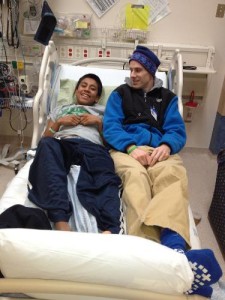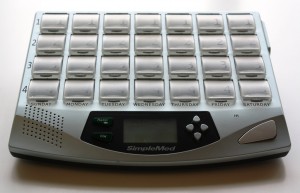
It can be hard enough to remember to take a multivitamin every day; imagine having to take 20 pills at specific times throughout the day, every day, for your whole life. That’s the reality individuals who have undergone an organ transplant must face. In order to stay healthy and to keep their bodies from rejecting their transplanted organ, a myriad of medications must be taken daily, including immunosuppressants. It can be a difficult pill to swallow, especially for teenagers.
According to research studies, adolescents have the worst outcomes after transplant out of any age group. Adolescents also have the highest rate of non-adherence, which means they either decide not to take their medication or just plain forget, which can lead to the rejection of the organ.
“You can imagine taking that many medications every day could get a little old. It’s a major burden to put on a teenager,” said Dr. Jodi Smith, medical director of kidney transplant at Seattle Children’s Hospital, and a researcher with the Center for Clinical and Translational Research (CCTR). “They were not meant to have this much stuff going on in their life. But if you don’t take your meds, you’ll eventfully need another kidney transplant, and once you lose one it’s harder to get another.”
It’s a serious issue, which is why Smith and other centers across the country, including Children’s Hospital of Philadelphia, are participating in a five year study funded by the National Institute of Health (NIH) to help improve medication adherence in adolescent kidney transplant recipients. The study, called TAKE-IT, aims to help researchers identify what interventions can help improve adherence among adolescents.
“While we know kidney transplants don’t last forever, there is no immunological or physiological reason a teenager’s transplanted kidney typically has the shortest life of any population,” said Smith. “That’s why we’re targeting medication adherence trying to understand what’s really going on in the teenage mind and how we can help.”

With the help of a unique pill box, teenagers enrolled in the study are reminded to take their medications using various forms of communication, including text messages. They also meet with a coach to work on problem solving skills and discuss when barriers arise that could contribute to non-adherence. The pill box also records when pills are taken. That information is then sent to the coach so we can see when the teens are actually taking their meds. For example, the coach may see that the teen is always taking their 7 p.m. meds at 9 p.m. This information allows the coach to give individualized support to the teen that is most relevant to them.
“Our goal is to identify the barriers teenagers face in taking their medication and then find ways to help remove or cope with those hurdles,” said Smith. “We understand if a teenager is at a basketball game or a school dance, the last thing they probably want to think about is taking their medication, but it’s important.”
The reality of a new kidney
Jack Frank was only 14 years old when he found out his kidneys were failing and he would need a kidney transplant. Frank was born with small kidneys. As he grew up, unfortunately, his kidneys did not.
“At first I was surprised and curious,” said Frank. “I didn’t know anything about kidney disease. I was nervous about the transplant. Nervous and a little scared, to be honest. It’s a big surgery.”
Frank was treated at Seattle Children’s Nephrology Clinic, one of the top five kidney transplant centers in the U.S.
 After a 10 hour surgery to replace his failing kidney, a couple days in the Pediatric Intensive Care Unit (PICU) and then a few more in the medical unit at Seattle Children’s, Frank was able to go home. He recovered quickly and went back to life as normal, with the exception of one new routine – he had to take 10 medications in the morning, then 10 more at night.
After a 10 hour surgery to replace his failing kidney, a couple days in the Pediatric Intensive Care Unit (PICU) and then a few more in the medical unit at Seattle Children’s, Frank was able to go home. He recovered quickly and went back to life as normal, with the exception of one new routine – he had to take 10 medications in the morning, then 10 more at night.
“Going through what I went through as a teenager, having to take a lot of medications, it’s intense and can get in the way of life,” said Frank. “I’ve had to mature a lot faster.”
Frank was enrolled in the TAKE-IT study about a year ago. He takes his medications at 6:30 a.m. and 6:30 p.m. every day and with the help of the pill box, rarely misses a dose.
“I really like the med box,” said Frank. “It lights up really bright when I have to take my meds, and I also get a text. It’s happened numerous times where I’ve forgot to take my pills, but then my phone buzzes or my box lights up and I instantly remember.”
The importance of medication
There are many reasons a teenager may not adhere to their medication regimen, which include:
- Forgetfulness
- Voluntary resistance – deciding not to take their medications
- Scheduling issues
- Organizational issues
Studies show that adolescent rates of non-adherence are 60% higher than adults and adolescents are 1.6 to 2.6 more likely than younger individuals to have rejection. Unfortunately, an adolescent’s mortality rate is also higher, almost 4.4 times, than younger recipients.
“The theme of our transplant research program here at Seattle Children’s is to improve kidney transplant outcomes,” said Smith. “There are many ways we work on improving how long a kidney transplant lasts. But one of the most basic is to help teens take their medications! We need to ensure they understand why it is important and then work with each teen individually to help them figure out how to fit it into their busy lives.”
And for the patients enrolled in the study, it seems to be working.
“This will always be a part of me,” said Frank. “The timing and remembering to take my meds is hard, but I have to take them to protect my kidney. I was given a second chance, and I don’t want to lose the kidney.”
Resources:
- Nephrology
- Kidney Transplant Program
- Transplant Center Statistics
- Meet the Nephrology Care Team
- Chronic Kidney Disease: What Does it Mean for Me?
- Lessening the Growing Pains With Teen Heart Transplant Transition Day

